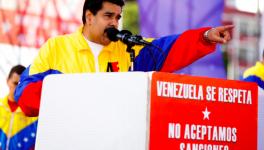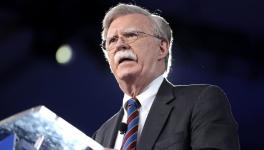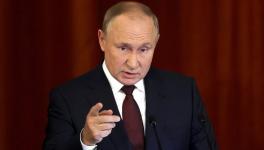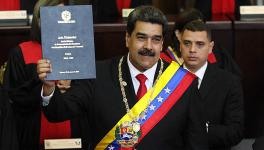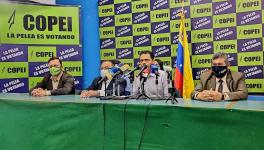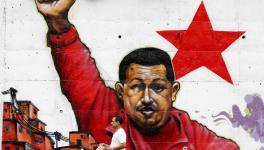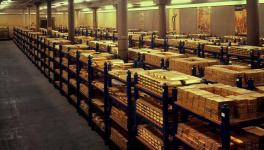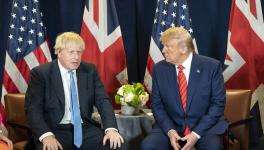Elections and Building Socialism Under Hybrid War: A Venezuelan Perspective
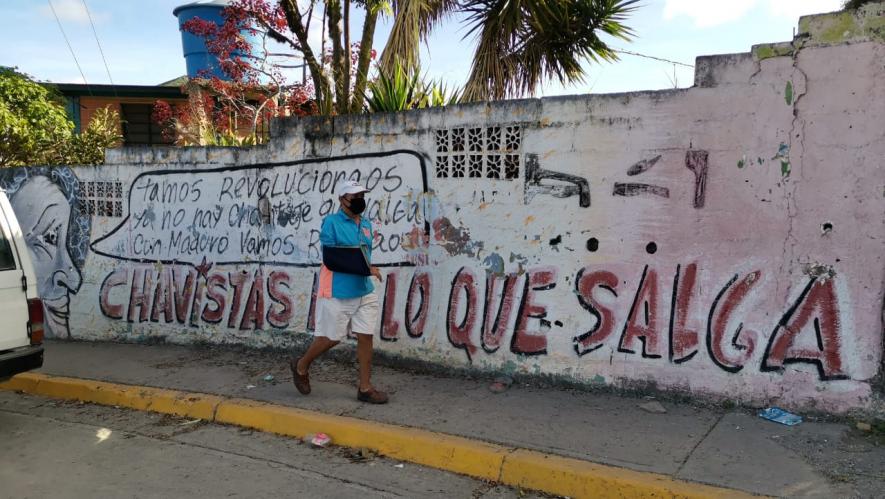
Streets of Caracas "Chavistas always". Photo: Zoe PC
Over 5 million Venezuelans went to the polls on Sunday, December 6 to elect the 277 members of the legislative assembly. The Great Patriotic Pole alliance of the United Socialist Party of Venezuela (PSUV) won the majority and will occupy 253 seats, and opposition parties will occupy the remaining 24 seats.
The elections brought an end to five years of control over the legislative body by the far-right opposition that used the assembly to advance an anti-government, pro-coup, pro-sanctions agenda. The elections were another manifestation of the people’s will against the US-backed anti-democratic opposition led by Juan Guaidó and Leopoldo López which had called for an election boycott.
The newly elected Assembly will be sworn in on January 5. It will have to explore how to address the deep economic crisis due to the economic blockade, and respond to the demands of people’s movements to continue deepening the revolution and the path towards socialism.
While in Venezuela, Peoples Dispatch, Barricada TV and ARG Medios spoke to Hernán Vargas of the Movimiento de Pobladores y Pobladoras (a people’s movement that fights for the right to dignified housing) about the national and geopolitical context of these elections. He also spoke about the challenges facing people’s movements in the next period and their proposals on the way forward.
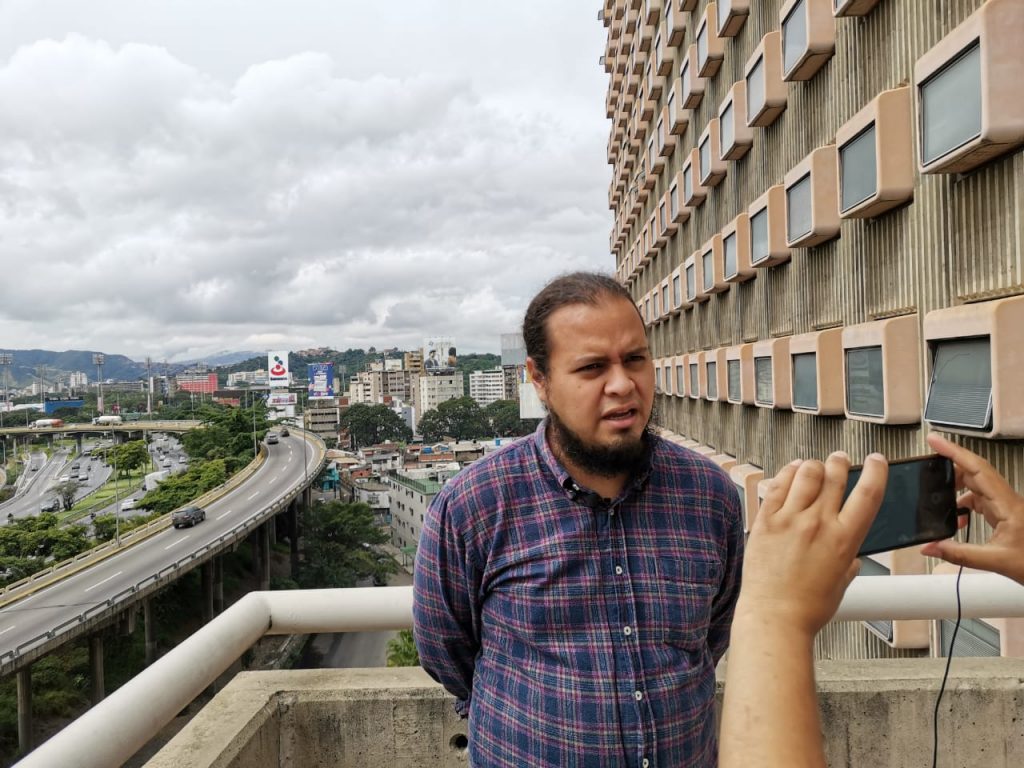
Hernán Vargas of the Movimiento de Pobladores y Pobladoras of Venezuela. Photo: Zoe PC
Peoples Dispatch: Legislative elections were held in Venezuela on December 6. Can you talk about the importance of these elections within Venezuela and internationally?
Hernán Vargas: There are several interesting and important aspects about what happened. After the results were announced early on December 7, President Nicolás Maduro spoke of the opening of a new political phase. What does this mean?
For me, it has to do with the fact that in 2015 the legislative branch had been won by the opposition and immediately they began to embark on a strategy of departing from the stage of national politics. In 2016, as soon as the [opposition controlled] National Assembly was installed, they said: “in six months we will overthrow the government.” From that moment on, a process of insurrection began, and two years later, in 2017, a situation of violence began which was referred to as the guarimbas.
During the guarimba violence in 2017, just to give an idea, a thousand were injured and wounded in street actions, 100 people were killed, and hate crimes were committed. I think the most infamous case was of Orlando Figueroa who was burned alive. He was a 21-year-old Black man who was burned alive simply because his attackers alleged that being Black is the same thing as being a Chavista.
The guarimba violence was a turning point in the political strategy of the opposition-controlled legislative body. However this violence saw a decline with the National Constituent Assembly elections which managed to pacify the country. The majority of the electorate participated in these elections to vote for peace and democracy, a defeat for the violent opposition.
Following that defeat, the key leaders of the Venezuelan opposition began to leave the country, to take politics out of the country. They dismantled their electoral machinery and their political action was moved to Washington or elsewhere. They would go on tours where they would ask for sanctions and intervention in Venezuela.
So now in 2020, to hold a legislative assembly election is to try to create a rupture with that trend, to recover legislative power, to return legislative power to the nation, to make laws and to fulfill its commitments. Over the last five years, the Assembly barely made any laws, nor did they fulfill the duties outlined by the Constitution.
This new National Assembly has a diverse political-ideological configuration, which includes those who support the government, those who believe in socialism, and those who do not. However, amid this diversity, there is an important common element, which is that there is consensus that there should be a cessation of sanctions, of unilateral coercive measures against Venezuela. While the previous National Assembly called for foreign intervention, we expect that this National Assembly will work to stop it.
The last National Assembly was also criticized for bringing politics outside the country. They were taking so-called political debates outside of the national space, which for us is an almost “anti-politics” stance. We engage in politics in our country under a logic of sovereignty and our political engagement outside the country is with the goal of asking countries to recognize our sovereignty, which has been a key priority for us in a context wherein we have had the entire apparatus of the United States government working against us, trying to attack our sovereignty.
We understand that their efforts have nothing to do with whether there are human rights in Venezuela, whether there is democracy in Venezuela, or how many people voted in Venezuela, but it is for them to gain strength in their geopolitical battle against China. Ultimately, the agenda of the United States is to take control of oil, of the geopolitical point that Venezuela represents as the axis of integration and to defeat socialism. This is the only thing at stake for the United States, that is why from the different sectors we foresee that in the next period we will see more sanctions, because the United States is desperate to take control of this bastion in order to win in its fight against China and Russia. I think that is something that the Venezuelan people have more or less clear in general.
PD: What is your evaluation of the participation in the elections?
HV: Many people have asked about the level of participation in last Sunday’s elections which was around 31%, especially given that in the course of 20 years of participation in the 25 electoral processes, we have seen similar margins of victory but much higher levels of participation. So now they ask, why was there less?
In this regard, we have seen the political effectiveness of the blockade. The blockade has played a role in breaking the Venezuelan materiality. In 2016, billions of dollars entered the country and this year, not even half a billion dollars has entered. We just have to look at this simple fact: while several years ago, you may have lived with, say 1,000 units, and now, that has decreased to ten or one. This can help explain what we see as a disaffiliation from politics.
A large part of the population feels that they have nothing to believe in, not only not in the government but in politics in general, in the political sectors because they feel that their vote will not change the material situation. They prefer to go to work and queue up for gas, and other things to stay alive. And what happens is that part of Venezuelan population, far from de-politicization, has made a political analysis that in the area of formal electoral politics, the situation is paralyzed and decides that survival and meeting daily needs is priority.
This is one way to understand December 6. But you also have another large section of the country – in a heroic act in the middle of a situation of material breakdown that I was describing, 30% of the population comes out saying we are voting because we believe that the issues facing Venezuela must be resolved here. It is a message to those who are out of the country lobbying for financial resources and asking for intervention, to say they should return to politics here. And it is telling the rest of the country, let’s all work together to address the problems that need to be solved.
Within this, there is an important call within Venezuela and to the world that we must demand an end of the blockade. We cannot live. It is hard to do anything under the conditions of the genocidal blockade to which we have been subjected. This blockade is the same as what has happened with Cuba and to some extent with Nicaragua. And it is the same strategy that the United States is using against some 37 other countries to break them through a blockade in an attempt to protect its imperial hegemony. It is using sanctions, force and the military apparatus and other forms of pressure to maintain control and power. In Venezuela, we have called this a hybrid war, and it operates in different ways to create internal breakdown and encourage an uprising.
“We must demand an end of the blockade. We cannot live. It is hard to do anything under the conditions of the genocidal blockade to which we have been subjected.”
We cannot forget that another key goal of the blockade is to generate an internal uprising, chaos and mutiny, and in this respect they have failed. On the contrary, the majority of the Venezuelan population is not asking for a blockade, it is not asking for sanctions, it is asking for an improvement in conditions. There are two thirds of the country that say I am going to work and I am going to ensure my basic conditions for survival because I need a country and a future; and the other third of the country says the same thing but also says, I am also organizing and participating because I need to return to politics.
One of the great challenges that arises from here on in is how to build a new model of life, economy and production that is not dependent on oil income. The US blockade has robbed us of the possibility of debt, the possibility of selling oil, the possibility of importing things. So we need to build an alternative economic model that is not dependent on these elements, as well as a rejuvenated political model that emerges from a different economic logic than the oil dependency which has characterized our country for over a century.
Read more | Nicolás Maduro: Despite everything, we were able to carry out elections in peace
PD: What are the challenges for the organized sections, the social movements that have projects that of course depend on the state in a certain sense, but that are also alternative spaces?
HV: In the Venezuelan case, which coincides with processes such as Ecuador and Bolivia, where a process of social transformation was initiated by formal democratic means, by elections, by peaceful means, one of the central elements was the drafting of a new constitution. This is an important element that has allowed us to reach the point that we are at today where there is a Venezuelan population that is sustained and depends on the democratic process. The majority of the population is not asking for neoliberalism, it is not asking for adjustments. It is asking for equal rights, it is asking for the guarantee of the rights that have been sustained during this time. But then the big issue is how is that equality of rights sustained? And how are the material conditions sustained?
I think that what has been discussed from the people’s movements in recent times is on the one hand, what forms of organization have been generating strength during this time? And how to coordinate all of the force and efforts of these forms of organization.
In the December 6 elections, there was a community-based organizational structure that was deployed to get people to vote but it’s the same muscle that has worked throughout the pandemic to test a lot of people in the community, to make sure that the level of coronavirus infection stays low, and to make sure that food is distributed to about 6 million people. This organizational structure has been essential in distributing the resources of the state directly to the people.
I mention this because it touches on the issue of the relationship between the state and people’s organizations. It has been in coordination with the state and not in collision with the state that many of these forms of organization have been generated. The state is the administrator of the public domain and what is public belongs to everyone, so logically we have to dispute what is in the state. For example, I am an active member of the Movement of Settlers (Movimiento de Pobladores y Pobladoras), and in our case, we have always argued that self-management and “mutual aid” is not something that exists outside or against the state. That is the neoliberal thesis that self-management is the poor resolving needs among themselves without disputing the public domain.
This debate between the public and private in the case of Venezuela is interesting because we also have been building political and organizational forces that are not necessarily private or public but have relationships to both. For example, the Comuna Maizal, one of many organizational experiences in the country, produces goods. Part of what is produced gets sent to the market and another part is for the community. The Comuna Maizal is neither part of the state nor is it private. The Comuna Maizal is a space of the collective, of the community. It is a communal form of organization that has been generated in recent times.
In a similar way, the Pioneers’ camps [spaces where families occupy plots of land and receive resources from the state to build their homes themselves] of the Movimiento de Pobladores y Pobladoras are communal spaces, they are collective spaces, they have their own mode of management, they have a form of collective ownership, they have a mode of administration and also a mode of production that is different. These spaces also have contradictions. They are submerged in the contradictions of the logic of capital while also building a logic that aims at the reproduction of life. We would not have been able to survive this year with an increasingly strong blockade plus the added challenges imposed by the pandemic if we did not have these alternative modes of organization, production and cohabitation.
And this is part of the position we have been consolidating at this time which is that only from the communal space, only through communal-based organizing and by working towards a communal future can we see the way out of the crisis. And this does not necessarily mean denying the role of state. The state has a key role to play and it must be defended. This position also calls for not the complete negation of the market, but its regulation and control by the state. Above all, it is not a proposal of a third way, but rather the recognition of the form of organization of the people that generates forms of property, organization, management, production that are different from the public and private.
I repeat this issue of the public and the private because in Latin America we have been sold the idea that in moments of crisis when the state is very weakened, the only way forward is the private sector and there is no alternative beyond the market.
In the Venezuelan case, it is a very important challenge because as I described before, the United States has been attacking the capacity of entry of funds that the state had, most significantly in its ability to raise oil revenue and ask for loans, and because of this there is a need to sustain the economy with the circulation of resources. There the question arises of how to encourage the entry of private capital.
In the people’s movements, we have had strong debates about what this means, we do not have a consensus understanding but we do know that the logic of the private sector and the market must be kept under control. The logic of the private sector always will be to accumulate capital and destroy life. With the pandemic, in these months it has become more than clear that the capital is not concerned with whether the people have enough to eat, what is important is the circulation of capital.
In this complicated context, we have been creating niches of organization, community and production whose objective is not the circulation of capital but the reproduction of life. I believe that the central challenge, as we are now beginning to position this campaign, is to say, look, there is a communal power that is emerging in the face of this and that is fighting for the role of the state in controlling the market, but above all, for a communal way of building socialism, which is not just an idea but being done in practice. There is this idea that Venezuelan socialism is only built when there is very good oil income and I believe that we are at the moment precisely to demonstrate that socialism is built in the moments of greatest crisis. Socialism is not necessarily built with a lot of money, with a lot of income. Socialism is built because it is a necessity in the real life of the people in order to survive.
Peoples Dispatch interviewed Hernán Vargas along with Arg Medios and Barricada TV
Get the latest reports & analysis with people's perspective on Protests, movements & deep analytical videos, discussions of the current affairs in your Telegram app. Subscribe to NewsClick's Telegram channel & get Real-Time updates on stories, as they get published on our website.










